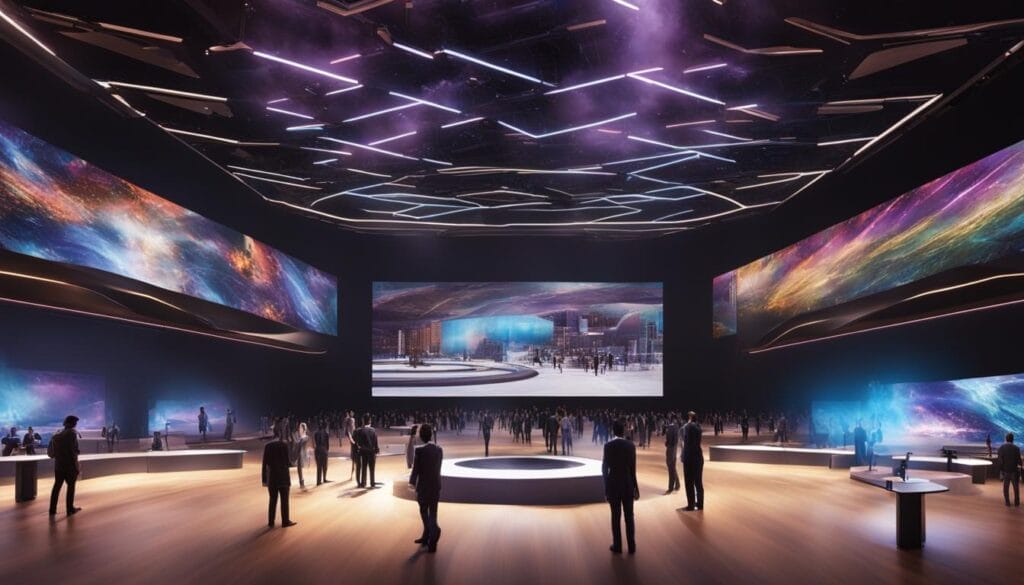Hybrid metaverse events are revolutionizing the world of virtual engagement. By blending physical and virtual elements, these events offer immersive digital experiences that bridge the gap between reality and fantasy. The future of virtual engagement lies in the metaverse, where attendees can dive into 3D environments, interact with customizable avatars, and explore endless possibilities. This emerging trend is gaining popularity and is projected to reach a market size of $936.57 billion by 2030, according to Grandview Research. Through the use of cutting-edge technologies like virtual reality and augmented reality, hybrid metaverse events provide unique and interactive experiences for participants, making them the next big thing in the event industry.
Key Takeaways
- Hybrid metaverse events blend physical and virtual elements, offering immersive digital experiences.
- The metaverse is the future of virtual engagement, with 3D environments and customizable avatars.
- These events are projected to reach a market size of $936.57 billion by 2030.
- Virtual reality and augmented reality technologies enhance the interactive experiences of hybrid metaverse events.
- Hybrid metaverse events are set to revolutionize the event industry and redefine virtual experiences.
Blending Physical and Virtual Elements: The Key to Hybrid Events
The success of hybrid metaverse events lies in the seamless integration of physical and virtual elements. These events utilize hybrid conference platforms that allow for both in-person and virtual participation, creating an inclusive experience for all attendees. Through the use of XR (extended reality) technologies, such as virtual reality and augmented reality, participants can engage in interactive sessions, presentations, and activities, regardless of their physical location. This combination of physical and virtual elements provides a dynamic and engaging environment that enhances the overall event experience.
Hybrid conference platforms serve as the foundation for blending physical and virtual elements in a seamless manner. These platforms enable organizers to host events that offer the flexibility of both in-person and virtual attendance. Attendees have the option to choose how they want to participate, whether it’s by joining in person at a physical venue or logging in virtually from the comfort of their own homes. By bridging the gap between the physical and virtual worlds, hybrid conference platforms ensure that no one is left out, opening up opportunities for global participation and increasing accessibility.
The use of XR technologies, such as virtual reality and augmented reality, is a key component of hybrid metaverse events. Virtual reality enables participants to immerse themselves in a fully digital environment, where they can interact with 3D objects and avatars in real-time. Augmented reality, on the other hand, overlays virtual elements onto the real world, enhancing the physical environment with digital content. By harnessing the power of these technologies, hybrid metaverse events offer novel and interactive experiences that captivate attendees and elevate the overall event engagement.
In summary, the blending of physical and virtual elements is essential to the success of hybrid metaverse events. Through the use of hybrid conference platforms and XR technologies, these events provide a seamless and immersive experience for participants, regardless of their location. The combination of physical and virtual elements creates a dynamic and engaging environment that enhances event engagement and sets the stage for the future of virtual engagement.
Hyperspace: A Case Study in Hybrid Metaverse Events

One notable example of a successful hybrid metaverse event is Hyperspace. Hyperspace is a platform that combines virtual reality conferences with metaverse networking. It allows attendees to seamlessly navigate and interact with a 3D environment, where they can engage in collaborative sessions, explore virtual exhibitor booths, and network with industry professionals. By leveraging the power of the metaverse, Hyperspace provides a unique and immersive experience that goes beyond traditional virtual events. With the ability to blend physical and virtual elements, Hyperspace showcases the potential of hybrid metaverse events in revolutionizing the future of virtual engagement.
At Hyperspace, attendees can participate in virtual reality conferences that offer a range of interactive sessions and presentations. They can dive into a 3D environment that mimics a physical conference venue, complete with auditoriums, breakout rooms, and exhibition halls. Through their customizable avatars, participants can engage in discussions, attend keynote speeches, and even network with other attendees. The immersive nature of the experience creates a sense of presence and connection, enhancing the overall engagement and learning opportunities.
Hyperspace goes beyond the traditional virtual event experience by incorporating metaverse networking. Attendees can explore virtual exhibitor booths, where they can interact with virtual products, access exclusive content, and engage in one-on-one conversations with company representatives. This virtual networking feature allows for meaningful connections and business opportunities, all within a realistic and immersive environment.
What sets Hyperspace apart is its seamless integration of physical and virtual elements. The platform enables both in-person and virtual participation, allowing attendees to choose how they want to experience the event. In-person participants can use virtual reality headsets to access the metaverse, while virtual attendees can join from anywhere in the world. This inclusivity and flexibility ensure that everyone can participate and benefit from the event, regardless of their location or circumstances.
| Key Features of Hyperspace | Benefits |
|---|---|
| Virtual reality conferences | Immersive and engaging experiences |
| Metaverse networking | Meaningful connections and business opportunities |
| In-person and virtual participation | Inclusivity and flexibility |
In conclusion, Hyperspace serves as a prime example of the potential of hybrid metaverse events. By combining virtual reality conferences with metaverse networking, Hyperspace provides a unique and immersive experience for attendees. The seamless integration of physical and virtual elements creates an inclusive and engaging environment that goes beyond traditional virtual events. As the future of virtual engagement continues to evolve, Hyperspace showcases the possibilities and benefits of hybrid metaverse events in revolutionizing the event industry.
Benefits of Hybrid Metaverse Events
Hybrid metaverse events offer a range of benefits for both organizers and attendees. One key advantage is the ability to host mixed reality events that provide a seamless blend of physical and virtual experiences. This allows for unlimited attendance, as participants from around the world can join the event without the limitations of physical space. The metaverse also offers unique personalized experiences, where attendees can create their own avatars and interact with the event in a way that suits them.
Additionally, hybrid metaverse events improve accessibility by eliminating barriers such as travel expenses and physical limitations. Attendees can participate from the comfort of their own homes or offices, making it easier for individuals with mobility issues or those located in remote areas to join. Moreover, hybrid metaverse events enhance safety by reducing the risk of exposure to viruses or other health hazards associated with in-person gatherings.
From an organizer’s perspective, hybrid metaverse events provide better audience data, enabling them to gather insights and analytics on attendee behavior, preferences, and engagement levels. This valuable data can be used to tailor future events, optimize content, and improve the overall event experience. Furthermore, the hybrid nature of these events allows organizers to adopt a more sustainable approach to event management by reducing the carbon footprint associated with travel and physical infrastructure.
| Benefits of Hybrid Metaverse Events |
|---|
| Unlimited attendance |
| Personalized experiences |
| Improved accessibility |
| Enhanced safety |
| Better audience data |
| Sustainable event management |
The Role of AI in the Metaverse
Artificial intelligence (AI) is a crucial element in shaping the metaverse and enhancing user interactions. Through AI-driven design algorithms, the metaverse can create wearables that seamlessly integrate with the virtual environment, providing both comfort and functionality for users. Additionally, AI enables the metaverse to comprehend and respond to user interactions in real-time, regardless of the language spoken. This ensures that participants can engage with the metaverse in a way that feels natural and intuitive.
AI algorithms generate virtual artwork and environments, creating visually stunning and immersive experiences within the metaverse.
Furthermore, AI plays a vital role in personalizing attendee experiences. By analyzing user data, AI algorithms can tailor the virtual environment to match each individual’s preferences and interests. This level of personalization ensures that every participant has a unique and meaningful experience, further enhancing the overall engagement and satisfaction of attendees.
With AI’s involvement, the metaverse becomes a dynamic and responsive space, constantly evolving to meet the needs and desires of its users. By leveraging the capabilities of AI, the metaverse continues to push the boundaries of what is possible, offering increasingly immersive and personalized experiences for all.
AI in the Metaverse: Key Takeaways
- AI-driven design algorithms create wearables that seamlessly integrate into the metaverse, providing comfort and functionality for users.
- AI enables the metaverse to comprehend and respond to user interactions in real-time, regardless of language spoken.
- AI algorithms generate virtual artwork and environments, creating visually stunning and immersive experiences.
- AI analyzes user data to personalize the virtual environment, ensuring each attendee has a unique and meaningful experience.
Table: The Role of AI in the Metaverse
| Role | Function |
|---|---|
| Enhanced Wearables | AI-driven design algorithms create wearables that seamlessly integrate with the metaverse, providing comfort and functionality. |
| Real-Time Interaction | AI enables the metaverse to comprehend and respond to user interactions in real-time, regardless of language spoken. |
| Virtual Artwork and Environments | AI algorithms generate visually stunning virtual artwork and environments within the metaverse. |
| Personalized Experiences | AI analyzes user data to personalize the virtual environment, ensuring each attendee has a unique and meaningful experience. |
The Future Impact of the Metaverse on Events

The metaverse represents a thrilling frontier for the future of events. With its immersive nature and interactive capabilities, the metaverse has the potential to revolutionize the way we engage and experience virtual events. As technology continues to advance, virtual reality goggles and other immersive platforms will become more accessible, allowing attendees to feel physically present in high-definition 3D environments.
The metaverse offers a shared digital space where people from around the world can connect and participate in events like never before. It breaks down geographical barriers and allows for unlimited attendance, giving event organizers the opportunity to reach a global audience. By harnessing the power of the metaverse, event planners can create truly unique and engaging experiences that go beyond the limitations of traditional virtual events.
Immersive platforms within the metaverse enable attendees to interact with the event environment and each other in a natural and dynamic way. Participants can explore virtual spaces, engage in interactive sessions, and collaborate with others, all within a visually stunning and immersive setting. The metaverse opens up a world of possibilities for event organizers to create memorable and impactful experiences that leave a lasting impression on attendees.
| Advantages of the Metaverse for Events: |
|---|
| Unlimited attendance |
| Immersive and interactive experiences |
| Global reach and connection |
| Dynamic collaboration and networking |
As the metaverse continues to evolve, it is clear that it holds immense potential for revolutionizing the event industry. By embracing virtual reality goggles and immersive platforms, event organizers can stay at the forefront of innovation and deliver truly transformative experiences for their attendees. The future of events lies within the metaverse, where boundaries are blurred and new possibilities emerge.
Integrating the Metaverse into Event Planning
As hybrid metaverse events continue to gain popularity, event planners need to consider integrating the metaverse into their event planning strategies. While widespread adoption may still be in the future, virtual events are here to stay and will continue to evolve. By embracing the metaverse, organizers can stay ahead of the curve and deliver unique and memorable event experiences.
Virtual reality platforms and immersive technologies are key tools for incorporating the metaverse into event planning. These platforms offer interactive sessions, personalized avatars, and virtual environments that enhance attendee experiences. With the ability to create dynamic and engaging virtual spaces, event planners can design immersive event experiences that go beyond traditional virtual events.
By leveraging virtual reality platforms, event planners can create interactive sessions that allow participants to engage with speakers or presenters in real-time. Attendees can explore virtual environments, attend workshops, and interact with virtual exhibitor booths. The metaverse also offers the opportunity to create personalized avatars, allowing attendees to customize their digital representation and immerse themselves in the event in a way that suits them.
By integrating the metaverse into event planning, organizers can tap into the potential of immersive technologies and create truly transformative experiences for their attendees. As the metaverse continues to evolve, it presents exciting possibilities for the future of event engagement.
Table: Benefits of Integrating the Metaverse into Event Planning
| Benefit | Description |
|---|---|
| Enhanced attendee experiences | Immersive technologies and virtual reality platforms offer interactive sessions, personalized avatars, and virtual environments that enhance the overall event experience. |
| Increased engagement | The metaverse provides dynamic and engaging virtual spaces that go beyond traditional virtual events, keeping attendees engaged throughout the event. |
| Improved accessibility | Virtual events in the metaverse eliminate barriers such as travel expenses and physical limitations, making events accessible to a global audience. |
| Collecting actionable data | The metaverse offers better audience data collection, allowing event planners to gather insights and tailor future events to meet attendees’ needs. |
| Future-proof event strategies | By embracing the metaverse, event planners can adapt to the evolving landscape of virtual engagement and ensure their events remain relevant and engaging. |
The Versatility of the Metaverse in Event Types
The metaverse is revolutionizing the way we experience events, offering a wide range of immersive and interactive possibilities. Whether it’s virtual fashion shows, virtual work meetings, or other immersive experiences, the metaverse has the versatility to adapt to various event types, providing attendees with unique and unforgettable experiences.
Virtual fashion shows are one example of how the metaverse is transforming the fashion industry. In a virtual environment, attendees can experience fashion collections in a dynamic and interactive way. They can explore virtual runways, interact with 3D models of clothing items, and even participate in virtual styling sessions. Virtual fashion shows offer endless creative possibilities, allowing designers to showcase their collections in innovative ways and provide an immersive experience for fashion enthusiasts.
Virtual work meetings are another area where the metaverse is making a significant impact. With the integration of immersive technologies, virtual work meetings can mimic in-person interactions, creating a more engaging and collaborative environment. Attendees can join virtual conference rooms, interact with realistic avatars, and engage in real-time discussions. The metaverse enables remote teams to connect on a deeper level, fostering creativity, productivity, and a sense of presence that traditional video conferences cannot replicate.
Immersive experiences, such as virtual reality concerts or interactive exhibitions, are also made possible by the metaverse. Attendees can immerse themselves in 3D environments, interact with virtual objects, and engage with other participants in real-time. These immersive experiences offer a new level of engagement and entertainment, transporting attendees to captivating virtual worlds where their senses are fully engaged.
As the metaverse continues to evolve, its versatility in event types will only expand. From live performances to educational conferences, the metaverse provides endless opportunities for event organizers to create immersive and interactive experiences that captivate audiences worldwide.
| Event Type | Description |
|---|---|
| Virtual Fashion Shows | Immersive fashion experiences in a virtual environment where attendees can explore virtual runways, interact with 3D models, and participate in styling sessions. |
| Virtual Work Meetings | Inclusive and engaging remote work meetings that replicate in-person interactions through immersive technologies, fostering collaboration and productivity. |
| Immersive Experiences | Virtual reality concerts, interactive exhibitions, and other immersive events that transport attendees to captivating virtual worlds. |
Conclusion
Hybrid metaverse events are revolutionizing the future of virtual engagement by seamlessly combining physical and virtual elements. The metaverse offers immersive digital experiences that bridge the gap between reality and fantasy, creating a dynamic environment for attendees. These events use cutting-edge technologies like virtual reality and augmented reality to provide unique and interactive experiences. With a projected market size of $936.57 billion by 2030, according to Grandview Research, hybrid metaverse events are the next big thing in the event industry.
By blending physical and virtual elements, hybrid metaverse events offer numerous benefits for both organizers and attendees. The ability to host mixed reality events eliminates physical space limitations, allowing for unlimited attendance from around the world. Personalized experiences, improved accessibility, and enhanced safety are some of the advantages of these events. Additionally, the metaverse’s integration with AI technologies enhances functionality and engagement, ensuring each participant has a unique and meaningful experience.
As the metaverse continues to evolve, it holds immense potential for revolutionizing the event industry. The seamless integration of physical and virtual elements, the versatility of immersive experiences, and the limitless possibilities it offers make the metaverse a game-changer. By embracing the metaverse and harnessing the capabilities of AI, event organizers can stay ahead of the curve and deliver transformative experiences that redefine virtual engagement.
FAQ
What are hybrid metaverse events?
Hybrid metaverse events are a combination of physical and virtual experiences that offer immersive digital engagement.
How do hybrid metaverse events blend physical and virtual elements?
These events utilize hybrid conference platforms and XR technologies like virtual reality and augmented reality to create interactive environments that bridge the gap between the physical and digital worlds.
How popular are hybrid metaverse events?
Hybrid metaverse events are gaining popularity and are projected to reach a market size of $936.57 billion by 2030 according to Grandview Research.
What is Hyperspace?
Hyperspace is a platform that combines virtual reality conferences with metaverse networking, providing a unique and immersive experience for attendees.
What are the benefits of hybrid metaverse events?
Hybrid metaverse events offer unlimited attendance, personalized experiences, increased accessibility, improved safety, and better audience data collection.
How does AI enhance the metaverse?
AI-driven design algorithms create wearables, enable real-time user interactions, generate virtual artwork and environments, and analyze user data to personalize the virtual environment and interactions.
How will the metaverse impact the future of events?
The metaverse has the potential to revolutionize events by allowing attendees to feel physically present in high-definition 3D environments and creating immersive and engaging experiences that surpass traditional virtual events.
How can event planners integrate the metaverse into their strategies?
Event planners can explore virtual reality platforms and immersive technologies to create interactive sessions, personalized avatars, and virtual environments that enhance attendee experiences.
What types of events can benefit from the metaverse?
The metaverse is versatile and can be applied to a wide range of events including fashion shows, sporting events, work meetings, conferences, and more, offering endless possibilities for immersive experiences.





